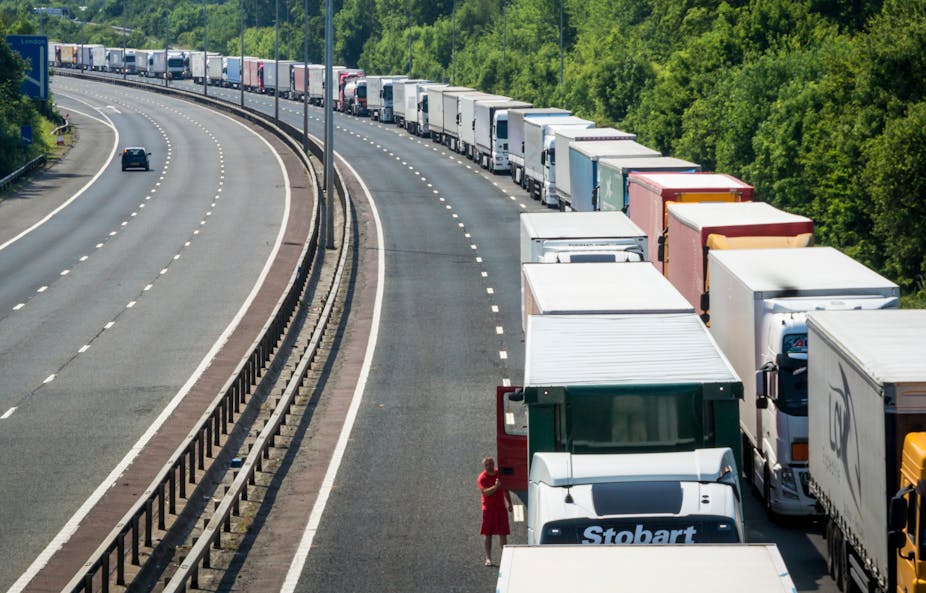With less than three months until the UK’s planned departure date from the EU, 89 lorries took part in a test run of Operation Brock – the Department for Transport’s contingency plan to manage the disruption that may be caused at the port of Dover and beyond by a no-deal Brexit.
It’s difficult to see what lessons could possibly have been learned from this test, given it involved a very small number of vehicles, all of which were carefully coordinated and directed to turn around before reaching the port terminal. If anything, the test underscores how ill-prepared the UK is for the logistical consequences of a hard or no-deal Brexit.
As an island nation, the UK is critically dependent on international trade. Together, imports and exports represent about 60% of the nation’s gross domestic product (GDP). Over 40% of exports from the UK currently go to the 27 other member states of the European Union (the EU27), while over 50% of imports come from the EU. The volume and value of these imports and exports continues to grow, as there is more trade between the EU and UK now than at any time in history. In short, the EU is the UK’s most important trading partner.
Here’s the rub
As an EU member state, the UK is fully integrated into the single market and customs union. This allows frictionless movement of goods across borders, which has played a key role in the growth of trade between EU member states, including the UK. This, in turn, has helped to create highly integrated pan-EU supply chains in many sectors, as both parts and finished products seamlessly cross international borders within the EU.

In such supply chains - for example, in the automotive sector - parts are often shipped back and forth between the UK and the EU27 many times, with few disruptions. This has made manufacturing and distribution more efficient, but it has also led to greater interdependence between operations based in different EU countries.
Brexit threatens to disrupt these supply chains, which depend on tariff-free access and the absence of border checks. This concern was widely articulated by business groups and trade associations during the 2016 referendum campaign, and has been often repeated as the Brexit negotiations have proceeded over the last two years.
The UK government recognises this risk, and has expressed its ambition to maintain frictionless trade after Brexit. But it has also recognised that, in the event of no-deal scenario, the EU would likely impose full third-country controls on goods entering the EU from the UK.
Disruption at Dover
The impact of a no-deal Brexit would be particularly acute at Dover, given the critical role this port plays in products movements. It is by far the biggest destination in the country for roll on/roll off ferries – those where the cargo is driven on and off in lorries, rather than lifted by cranes – handling almost 3m units of freight annually. Under the current regime, lorries can drive off the ferries and be on the motorway within minutes of arriving in Dover.
At the moment, the paperwork associated with a few hundred lorries bound for non-EU countries from Dover is checked by officials every day. In the event of a no-deal Brexit, the details of goods on the thousands of lorries that travel to or from the EU daily, without needing to supply any customs documentation, would also need to be checked at Dover.

The port of Dover has been warning for some time of serious post-Brexit traffic congestion in the town and on surrounding routes. Richard Christian, the port’s head of policy, reportedly said in June 2018 that there would be “regular gridlock” in Kent in the event of a hard Brexit. Port chiefs at Dover have asserted that a two-minute delay in Dover would lead to a 17-mile queue of lorries on the M20.
Project chaos
This type of disruption to freight traffic travelling via ferries or the channel tunnel is likely to have a profoundly detrimental impact on Britain’s economy. So the DfT developed Operation Brock, to mitigate the risk of cross-channel disruption that may be caused by new post-Brexit border arrangements.
The plan involves lorries being parked at the disused Manston airport site, which has a capacity for around 6,000 vehicles, and then being directed along the A256 towards Dover, to regulate the traffic. The Road Haulage Association (RHA) described the dry run of Operation Brock as “too little, too late”. Its CEO Richard Burnett said that “this process should have started nine months ago”, and its managing director of policy and public affairs, Rod McKenzie, added that “we are so far behind where we should be with only 59 working days to go”.
Critics might see this as further evidence of “project fear”, but the reality is that the impacts of a no-deal Brexit will be immediately and acutely felt in the hinterland of the key strategic ports, and Dover in particular. The resulting disruption will inevitably have a seriously detrimental impact on the ability of firms to provide products to their customers in a cost-effective and timely manner.
History tells us that business is resilient, and capable of adapting to major shocks, which will no doubt help it to develop long term resolutions to these challenges. But in the short term, it’s difficult to see anything other than serious traffic congestion in the vicinity of the UK’s major ports, with a chaotic impact on the wider logistics networks and supply chains, of which they form a critical part.

